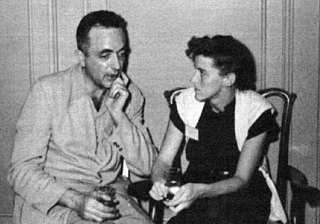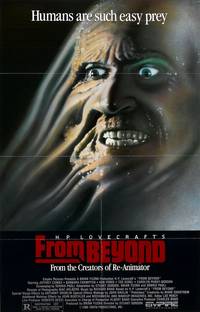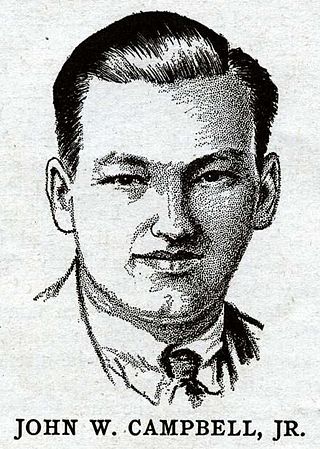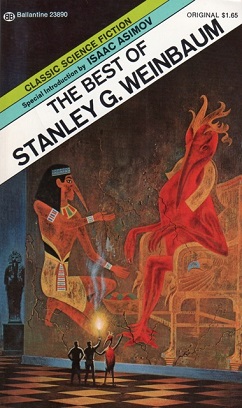Related Research Articles

John Wood Campbell Jr. was an American science fiction writer and editor. He was editor of Astounding Science Fiction from late 1937 until his death and was part of the Golden Age of Science Fiction. Campbell wrote super-science space opera under his own name and stories under his primary pseudonym, Don A. Stuart. Campbell also used the pen names Karl Van Kampen and Arthur McCann. His novella Who Goes There? was adapted as the films The Thing from Another World (1951), The Thing (1982), and The Thing (2011).

Katherine Anne MacLean was an American science fiction author best known for her short fiction of the 1950s which examined the impact of technological advances on individuals and society.

Murray Leinster was a pen name of William Fitzgerald Jenkins, an American writer of genre fiction, particularly of science fiction. He wrote and published more than 1,500 short stories and articles, 14 movie scripts, and hundreds of radio scripts and television plays.

Stanley Grauman Weinbaum was an American science fiction writer. His first story, "A Martian Odyssey", was published to great acclaim in July 1934; the alien Tweel was arguably the first character to satisfy John W. Campbell's challenge: "Write me a creature who thinks as well as a man, or better than a man, but not like a man." Weinbaum wrote more short stories and a few novels, but died from lung cancer less than a year and a half later.
The Ultimate Foe is the fourth and final serial of the larger narrative known as The Trial of a Time Lord which encompasses the whole of the 23rd season of the British science fiction television series Doctor Who. It was first broadcast in two weekly parts on BBC1 on 29 November and 6 December 1986. This segment is also cited in some reference works under its working title of Time Incorporated. The title The Ultimate Foe is never used on-screen and was first used in relation to these episodes for the 1988 novelisation, with the two episodes that comprise the serial being referred to as The Trial of a Time Lord Parts Thirteen and Fourteen. This was the last story to feature Colin Baker as the Sixth Doctor, as Baker declined to do the regeneration for the following story, Time and the Rani.

James Henry Schmitz was an American science fiction writer born in Hamburg, Germany of American parents.

"From Beyond" is a horror genre short story by American writer H. P. Lovecraft. It was written in 1920 and was first published in The Fantasy Fan in June 1934.

Raymond Fisher Jones was an American science fiction author. He is best known for his 1952 novel This Island Earth, which was adapted into the eponymous 1955 film.
"The Little Black Bag" is a science fiction novelette by American Cyril M. Kornbluth, first published in the July 1950 edition of Astounding Science Fiction. It won the 2001 Retroactive Hugo Award for Best Novelette and was also recognized as the 13th best all-time short science fiction story in October and November 1971 Analog Science Fact & Fiction poll, The Reference Library review article, tied with "Microcosmic God" by Theodore Sturgeon. It was among the stories selected in 1970 by the Science Fiction Writers of America as one of the best science fiction short stories published before the creation of the Nebula Awards. As such, it was published in The Science Fiction Hall of Fame Volume One, 1929–1964.

From Beyond is a 1986 American science-fiction body horror film directed by Stuart Gordon, loosely based on the short story of the same name by H. P. Lovecraft. It was written by Dennis Paoli, Gordon and Brian Yuzna, and stars Jeffrey Combs, Barbara Crampton, Ken Foree and Ted Sorel.
"The Planet of Doubt" is a science fiction short story by American writer Stanley G. Weinbaum that was first published in the October 1935 issue of Astounding Stories. It is Weinbaum's third story featuring Hamilton Hammond and Patricia Burlingame, a sequel to "Parasite Planet" and "The Lotus Eaters".

This is a bibliography of works by American writer John W. Campbell Jr.
"The Lotus Eaters" is a science fiction short story by American writer Stanley G. Weinbaum originally published in the April 1935 issue of Astounding Stories. "The Lotus Eaters" was Weinbaum's fifth published story, and is a sequel to "Parasite Planet".
"The Mad Moon" is a science fiction short story by American writer Stanley G. Weinbaum, first published in the December 1935 issue of Astounding Stories. As did his earlier stories "A Martian Odyssey" and "Parasite Planet", "The Mad Moon" emphasizes Weinbaum's alien ecologies. "The Mad Moon" was the only Weinbaum story set on Io.

"The Red Peri" is a science fiction novella by American writer Stanley G. Weinbaum, which first appeared in the November 1935 issue of Astounding Stories. Sam Moskowitz has noted that Weinbaum planned to write a series of sequels to "The Red Peri" but died before he could do so. "The Red Peri" is the only Weinbaum story set on Pluto. The novel also inspired Arthur C. Clarke, who stated that David Bowman's helmetless spacewalk in 2001: A Space Odyssey was inspired by Frank Keene's escape from the pirate base in "The Red Peri".

Tales of Tomorrow is an American anthology science fiction series that was performed and broadcast live on ABC from 1951 to 1953. The series covered such stories as Frankenstein starring Lon Chaney Jr., 20,000 Leagues Under the Sea starring Thomas Mitchell as Captain Nemo, and many others.

A Martian Odyssey and Others is a collection of science fiction short stories by author Stanley G. Weinbaum. It was first published in 1949 by Fantasy Press in an edition of 3,158 copies. The stories originally appeared in the magazines Wonder Stories, Astounding and Thrilling Wonder Stories.

The Best of Stanley G. Weinbaum is a collection of science fiction stories by Stanley G. Weinbaum, published in 1974 as an original paperback by Ballantine Books as a volume in its Classic Library of Science Fiction. The volume included an introduction by Isaac Asimov and an afterword by Robert Bloch. Ballantine reissued the collection twice in the later 1970s; Garland Publishing published a library hardcover edition in 1983, and Sphere Books released a UK market edition in 1977, under the title A Martian Odyssey and Other Stories. The original edition placed third in the 1975 Locus Poll for best genre collection.

She Devil is a 1957 American widescreen science fiction horror film, shot in RegalScope, from Regal Films, that was produced, written, and directed by Kurt Neumann. The film stars Mari Blanchard, Jack Kelly, and Albert Dekker and was theatrically released by 20th Century-Fox on a double bill with Regal's Kronos.

The Other Worlds is an anthology of science fiction, fantasy, and horror stories, edited by Phil Stong. It was originally published by Wilfred Funk in 1941, with a lower-price edition following from Garden City Publishing a year later. The Encyclopedia of Science Fiction describes it as "the first important sf Anthology".; it remains in the collection of nearly 200 academic libraries in 2015.
References
- ↑ ISFDB entry
- ↑ "1971 Astounding/Analog All-Time Poll". Locus magazine. Archived from the original on October 23, 2007. Retrieved February 14, 2010.